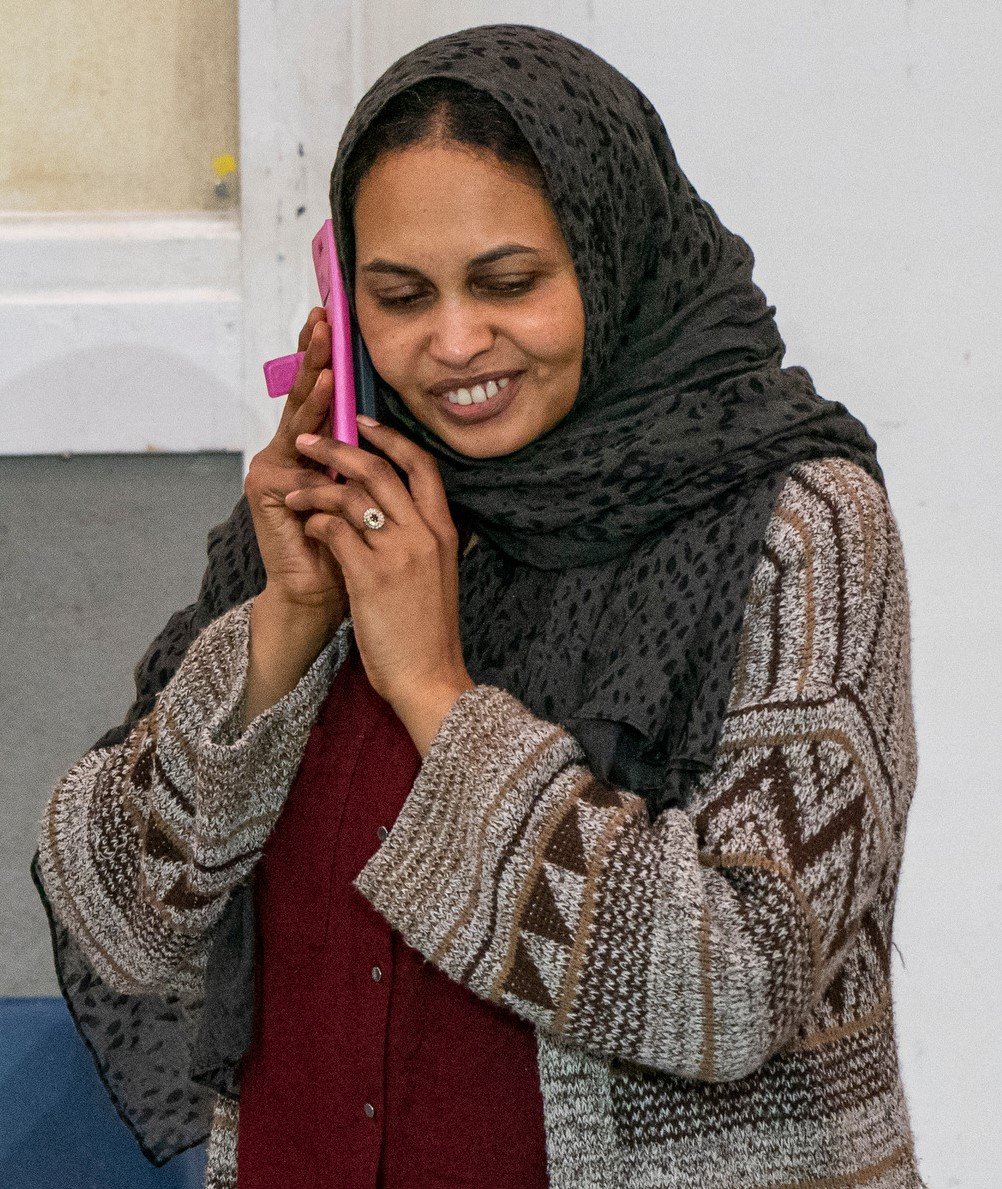Colin (Nick Holder, far right) introduces himself to Paige (Grace Willoughby, left), while Paige’s father, Dean (Alex Austin, center), and Dean’s partner Emma (Janet Etuk) look on over breakfast.
Alexander Zeldin’s Love is a remarkably naturalistic and empathetic work about individuals and families experiencing homelessness. The play takes place in an emergency housing facility in London and was created in collaboration with those who have firsthand experience of such a setting. Zeldin, who is also the director, writes in a program note that “a crucial step in the creation of Love was meeting these families, visiting their homes over two years, involving them in workshops and rehearsals, and improvising with them on the subjects and scenes in the play.”
Hind Swareldahab as Sudanese refugee Tharwa. Photographs by Stephanie Berger.
Love is a mixture of heightened realism and the highly theatrical. This combination is reflected in the details of Natasha Jenkins’s set design of the facility’s common area—two tables, a kitchenette, doors leading to bedrooms and the shared bathroom, grimy walls, a lone sneaker on the bathroom roof—alongside the decision to seat 75 spectators on the set in Park Avenue Armory’s Drill Hall. The actors sometimes take a seat among the audience or make eye contact; in a quietly emotional moment near the end, one character reaches out for some human touch. The harsh, sometimes sputtering lighting of the housing facility (designed by Marc Williams) also covers the audience (not only those seated on the set).
Dean (Alex Austin) shares a room with his son Jason (Oliver Finnegan), his daughter Paige (Grace Willoughby), and his pregnant partner Emma (Janet Etuk). Next door is Colin (Nick Holder) and his elderly, sometimes incontinent mother Barbara (Amelda Brown), who have been at this “temporary” facility for a year, which terrifies Dean and Emma, as they insist theirs will be a short-term stay. Colin is a lumbering, sweet presence, though also a bit messy and awkward. He’s quick to let them know their caseworker is a “twat” and that the system simply doesn’t work: there is no next step to permanent housing. Though Emma tries to protect Jason and Paige from this knowledge, even as they accumulate daily traumas, her creeping realization of the situation as Dean tries to maintain a forced, desperate optimism is in itself a tragedy. Her goal is not to have her child born in their surroundings, while Barbara’s is not to die there, and what Colin knows is that both are impossible hopes.
Tharwa (Hind Swareldahab), recently arrived from the Sudan, is alone at the facility but says that her children will be joining her at some point. Like newly arrived Adnan (Naby Dakhli), from Syria, who limps noticeably and mostly leaves the room when the others are around, she keeps to herself. Neither refugee is much regarded by the rest of the residents, but Tharwa and Adnan realize they both speak Arabic and suddenly come to vivid life and share a conversation (in part about orange juice). It is left to us to imagine what Tharwa and Adnan must have seen and experienced in war-torn Sudan and Syria.
Dean brings home cereal from the food bank and shows it to Paige (Amelia Finnegan, who alternates in the part with Grace Willoughby).
The play showcases quiet, everyday moments. The labyrinthine bureaucratic system that frustrates and demeans the characters remains faceless, offstage. Conflicts among the characters—over hogging the bathroom, the ownership of a tea mug, or shelf space in the refrigerator—don’t escalate. There are stretches of silence as people eat or navigate the common space. That this is gripping theater and occasionally harrowing is a testament to the uniformly excellent performances.
Although Zeldin has chosen to set the play at Christmastime, he avoids overly sentimental pitfalls. But the play is far from stoic or cold. In one of the final scenes, an accident spurs Emma to act out in a way previously unthinkable to her; this, combined with Colin’s surprisingly vulnerable reaction and their ensuing moment of forgiveness and connection, offers a flicker of hope that humanity can shine through in a dehumanizing place and system. Barbara’s exit into the offstage blackness, in which she briefly takes the hands of audience members, seems to be Zeldin insisting that we not look away or forget these characters as we step out onto Park Avenue after the show.
Love runs through March 25 at the Park Avenue Armory (643 Park Ave.). Evening performances are at 7:30 p.m. Monday–Thursday, and at 8 p.m. Friday–Saturday; matinees are at 2 p.m. Saturday. For tickets, call (212) 933-5812 or visit armoryonpark.org.





